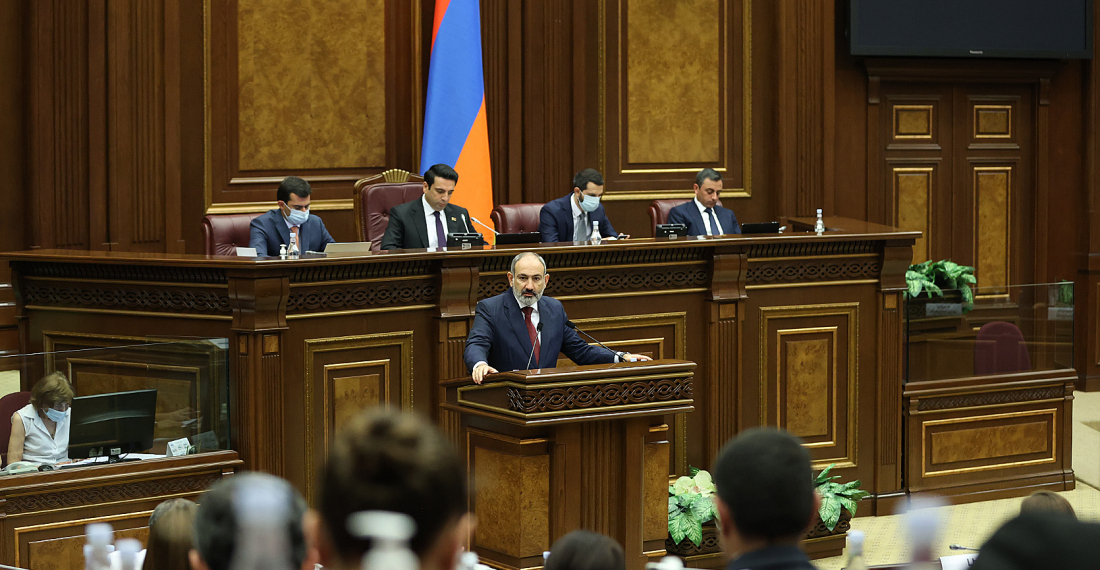The prime minister of Armenia, Nikol Pashinyan, yesterday (24 August) addressed the importance of building peace in the region by considering the interests of Armenia’s neighbours alongside its own, highlighting the importance of the full implementation of the trilateral agreements of 10 November and 11 January signed by Armenia, Azerbaijan, and Russia. The leader was speaking at the start of a session introducing his government’s action plan for 2021-2026 to Armenia’s National Assembly.
Pashinyan stated that the entire plan of his government fell within two main tasks laid out within his party’s pre-election campaign: firstly, the creation of a “dictatorship of law and order”; and secondly, the opening of an era of peaceful development for Armenia and the region. Referring to the second part as “the Government's greatest mission to the people following the snap elections”, the Armenian leader said that the most urgent issue was using political and diplomatic tools to ensure the security of Armenia and the self-proclaimed Nagorno-Karabakh Republic (NKR). He reiterated Armenia’s willingness to return to negotiations under the auspices of the OSCE Minsk Group Co-Chairs, noting the Co-Chairs’ view that a comprehensive and lasting settlement for Nagorno-Karabakh is still required, based on the principles of the non-use of force or threat of force, the right to self-determination, and territorial integrity.
Pashinyan highlighted the work of the trilateral working group of Armenia, Azerbaijan, and Russia – to open regional economic and transport links – as an “important tool and platform for creating a favourable environment around Armenia”. He emphasised that whilst the suggestion of a corridor for Azerbaijan through Armenian territory was not included in either the November 2020 or January 2021 trilateral statements, Azerbaijan should be able to access its western exclave through Armenia just as Armenia should be able to access both Russia and Iran through Azerbaijan. In saying this, he acknowledged the security risks that opening transport links involves – noting that it cannot come at the expense of Armenia and the de facto NKR’s security – but expressed that Armenia must acknowledge the interests of the surrounding countries as well as its own.
He stated, “If we want to create a favourable regional environment around Armenia, we must make Armenia a favourable environment for the region […] If you will, this is our strategic security challenge.” He continued, “This is not about forgetting something, giving up, establishing brotherly or friendly relations, but about answering the question of what we will do with the atmosphere of hostility. Should we deepen it? Should we set ourselves the task of destroying those whom we consider enemies? They will set the same task. Even if they have already set that task, are we ready to make the management of this threat a part of our daily work and agenda?”
Pashinyan drew attention to the fact that the other countries of the region do not have hostile relations with each other despite that not meaning that there were no problems between them. He warned that being the object and subject of hostility even affects Armenia’s relations with friendly countries, and that whilst this is an issue of the region, it is also an issue of Armenia’s agenda. For this reason, he said that the agenda of overcoming the atmosphere of hostility in the region should be at the centre of the country’s regional foreign policy co-operation agenda: “all the shouting and cursing must be silenced. Argument, analysis, rational judgment must speak”
He said that Armenia’s foreign policy efforts to unblock the region, “if constructive by other actors, will lead to an atmosphere of peaceful, mutually beneficial coexistence in the region”, referring to “the full and unconditional implementation of the steps envisaged by the trilateral statements” as “key to this step”.
Pashinyan called for the establishment or development of normal relations with all Armenia’s neighbours and, to this end, said that demarcation and delimitation of borders with Azerbaijan and Georgia “will be essential for the formation of a stable regional environment”. Whilst acknowledging that the situation with Azerbaijan is more complicated than with Georgia, he said, “no matter how hard it is, Armenia is ready to move forward with that agenda”. He reiterated the importance of maintaining stability on the Armenian-Azerbaijan border during this process, raising the prospects of the deployment of Russia border guards, a CSTO observation mission, and monitoring by the OSCE Co-Chairs – “there are active discussions on the deployment of Russian border guards, work with the CSTO continues, and the OSCE Minsk Group Co-Chairs are also showing some interest in the issue.”



